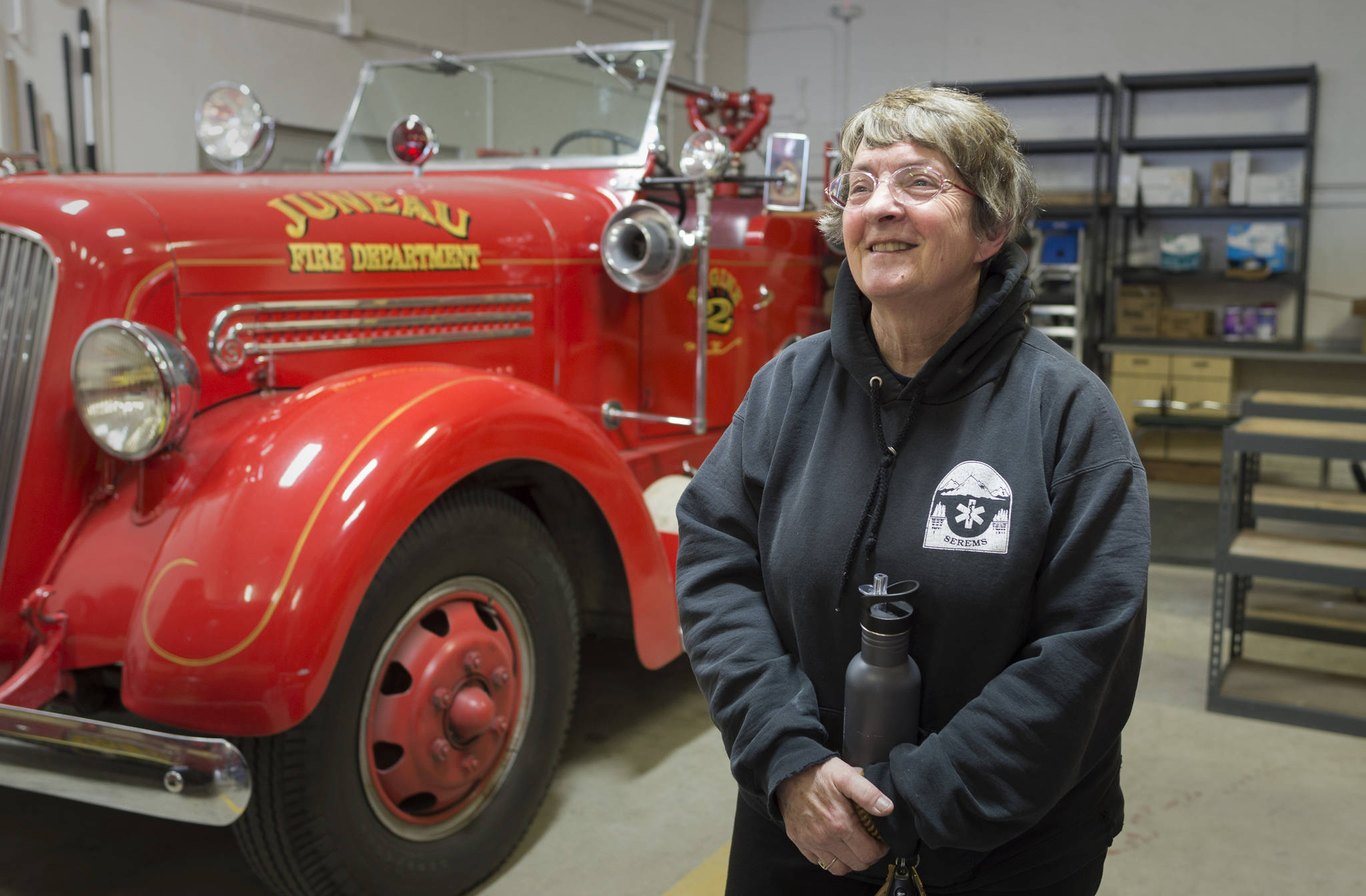Kathy Miller keeps her windshield clean and her pager on.
For the past 10 years, Miller has been on call as a volunteer with Capital City Fire/Rescue. When there’s a car crash Out the Road, Miller is often one of the first people on the scene.
She’s usually there in five or 10 minutes once her pager goes off. She likes to say that when she arrives on a scene, she likes to “calm things down.” Miller, a former nurse, evaluates people’s injuries and relays information back to the CCFR responders (the cavalry, as she calls them).
Most volunteers, CCFR Assistant Chief Ed Quinto said, last around five years. Miller has been around twice that long, serving as an EMT after retiring 10 years ago from her nursing job.
Miller, now 65, is retiring from CCFR at the end of March. She said she’ll still find ways to be involved in the community, and though she acknowledges it might be a little “hokey,” she said that drive is what’s kept her involved in the department for so long.
“If I have a skillset and I have an ability to do something,” Miller said, “I’m going to do it.”
Every call matters
Rob Kindred is another outlier, having worked with the department for 20 years.
Kindred, who was a volunteer in Oregon for seven years prior to moving to Juneau in late 1997, is a driver and engineer (among other roles) for the department. Quinto recalled numerous times when Kindred drove vehicles to major fires.
A few calls stand out, Kindred said, including the Holy Trinity Church fire in January 2006 and the fires at the Gastineau Apartments. Though those incidents made headlines and had large effects on the community as a whole, Kindred said he takes each situation seriously.
“In a way, every call is significant,” Kindred said, “especially for the people involved.”
For seven and a half years, Kindred lived at the Douglas fire station, ready to get the fire engines out and running at a moment’s notice. Now he primarily works at the Auke Bay Station, still specializing in driving ambulances.
He joined CCFR in January 1998, and said there were more than 30 firefighters in the Douglas district where he worked. There were separate districts for Douglas, downtown, the airport station, Auke Bay and Lynn Canal, he recalled. They could all respond to calls in their own areas, but now that staffing has dwindled so much they all have to work together, Kindred said. When there’s a fire, everybody responds to it now.
Kindred stood in the garage at the Auke Bay station on a February afternoon, wearing a navy blue CCFR hat and greeting others who walked around the station. Part of the reasoning for staying involved for this long, he said, is the camaraderie that comes with being part of the department.
“Honestly, I’m not sure what’s kept me around this long,” Kindred said. “It’s become a habit. It’s just become something I’ve gotten used to doing. It’s a way of still helping out the community after all these years and it’s a family. They don’t call it a brotherhood for no reason.”
Over the years, quite a bit has changed about fighting fires, Kindred said. With more plastic involved in furniture and other products, any fire can become a hazardous materials incident.
Partially as a result, firefighters have to keep their gear even cleaner than they did before. Kindred said it used to be a source of pride to have dirty gear that smelled of smoke. Now, everyone is required to keep their gear as clean as possible to reduce the chance of inhaling toxic residue.
Kindred said the job is worth it, despite the risks. He cited an adage that’s common in fire departments throughout the country.
“It’s the toughest job you’ll ever love,” Kindred said. “It’s true.”
Handing the equipment back
Neither Kindred nor Miller is fond of attention. Miller refers to her role as “filling in around the sides,” helping to calm people down and prepare the scene for the rest of the responders.
Her grandson Michael sees it differently.
When Michael was starting kindergarten, he and his classmates were comparing what the people in their families did for a living. He spoke to Miller about it one day.
“You could tell them your grandma’s a nurse,” Miller told him.
“No,” Michael responded. “I’m going to tell them my grandma’s a firefighter.”
Miller smiled as she recounted the exchange.
“I gave him street cred for like three years,” Miller said.
Kindred and Miller are more than willing to give other people credit. It seems to be their default setting. Kindred said he’s not sure how much longer he’ll stick with it, but he’ll do it as long as it’s in the best interest of everyone around him.
“It’s like any job,” Kindred said. “When is the best time to leave? I figure that’ll be when I can’t do it or if I can’t do it without being a danger to everyone else because they have to go rescue me and pull me out or do something. That’s when it’s time.”
For Miller, who is now raising Michael, it was time to step aside and focus on that. She opened her trunk one March afternoon and gazed at the boots, helmet, gloves and various other pieces of equipment in her car, ready to be used. She’ll have to give most of it back at the end of the month.
She joked that even the equipment appears to be ready to retire, including the pager she’s kept at her side for a decade.
“My poor old pager,” Miller said. “I was trying to put the battery back in it and it fell apart, and I thought, ‘Oh, that’s telling me something.’”
• Contact reporter Alex McCarthy at 523-2271 or amccarthy@juneauempire.com. Follow him on Twitter at @akmccarthy.

